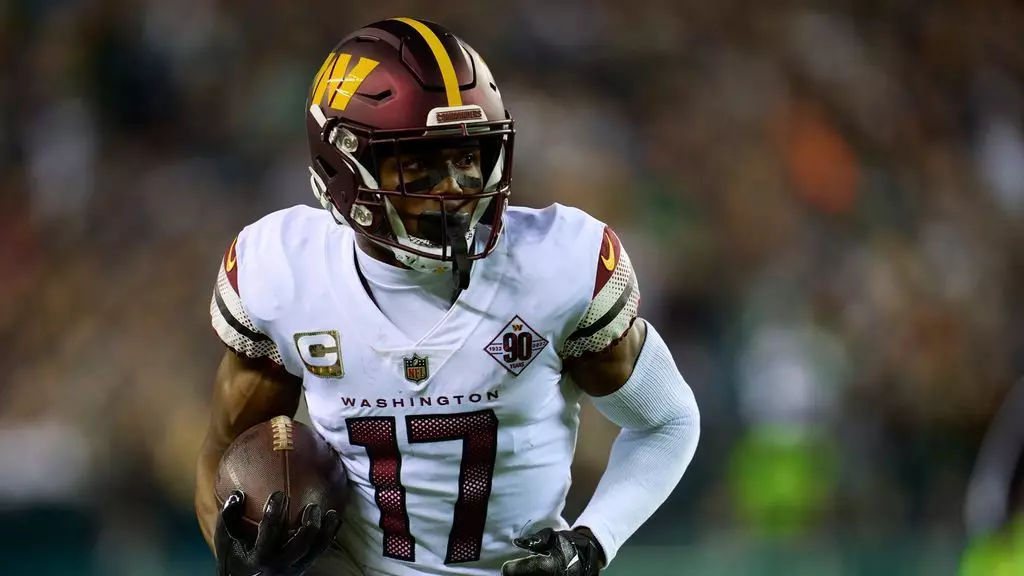The recent publicized trade request by Washington Commanders star receiver Terry McLaurin exposes the deep-rooted imbalance of power within professional sports leagues. For far too long, teams have wielded insurmountable control over players’ careers, often neglecting their fundamental rights and personal aspirations. McLaurin’s situation underscores a uncomfortable truth: athletes are increasingly realizing that their value extends beyond a mere commodity in the league’s economic machinery. His decision to request a trade is less about individual greed and more an indictment of the systemic issues that prioritize business interests over player well-being and fairness.
Teams, enamored with their own authority, craft narratives to frame these disputes as “business as usual.” Coach Dan Quinn’s dismissive assurance that a trade request is “not a distraction” reflects a troubling denial of the human side of professional athletes. It’s a convenient shield designed to uphold team cohesion and public image, but it dangerously oversimplifies the emotional toll such conflicts impose. McLaurin, a proven performer and community favorite, is not just a bargaining chip; he’s a person whose career aspirations and financial security are intricately linked to the league’s wider economic calculus.
Negotiation Inequality and the Fragile Future of Star Players
The core of this controversy hinges on a disparity in bargaining power. McLaurin’s case is emblematic of a broader trend where veteran players, approaching their late 20s and early 30s, are squeezed by teams hesitant to commit top dollar, citing age and market comparisons. The reluctance of Washington to meet McLaurin’s valuation—aligned with deals like DK Metcalf’s—reveals a troubling obsession with ageism and short-term financial pragmatism that undervalues dedicated athletes.
It is a systemic issue rooted in the league’s approach to contracts. The NFL’s structure, one that often favors team rights over player security, fosters an environment where even proven stars must fight fiercely for fair compensation. McLaurin’s frustration is not an isolated incident but a symptom of a flawed system that sees players as transient assets rather than valuable individuals deserving respect and security. The league’s failure to adapt to a new era where athletes are more aware and assertive further highlights its insensitivity and shortsightedness.
Speculating Beyond the Surface: The Human Side of the Negotiation
While team officials and coaches like Dan Quinn prefer to dismiss these conflicts as “business,” the reality is far more complex and emotionally charged. McLaurin’s recent injuries, unmet contract expectations, and the decision to remain engaged with fans and team activities reflect a player caught in the middle—a professional trying to balance his dedication with frustration and uncertainty. His ongoing rehab work, autographs, and meetings demonstrate a desire to maintain professionalism despite the brewing storm.
It’s revealing how the league and teams often dismiss these personal struggles, preferring to focus on the game and the bottom line. Yet, these issues have a real impact on performance and morale. McLaurin’s leadership, fan support, and emotional investment in the team should be valued more than they are in this cold, transactional environment. NFL franchises need to recognize that fostering an environment of fairness and respect doesn’t threaten their interests—it enhances them.
The Broader Implication: Reform Is Urgently Needed
The incident with McLaurin is a stark reminder that the league’s current model is unsustainable if it continues to treat players as interchangeable assets rather than individuals with rights. The league’s failure to bridge the widening gap between player expectations and team policies signals a fundamental need for reform. Players must gain more leverage, ensuring contracts reflect their contributions and longevity, not just their age.
It’s time for the NFL to reconsider its approach to player management. Transparency, fairness, and respect should be the pillars of negotiations, not afterthoughts overshadowed by profit motives. A league that values its athletes just as much as its fans and shareholders will build a healthier, more sustainable environment—one that recognizes that the true strength of football lies in the dignity and well-being of those on the field. Only then can it foster genuine loyalty and elevate the sport beyond mere entertainment.

